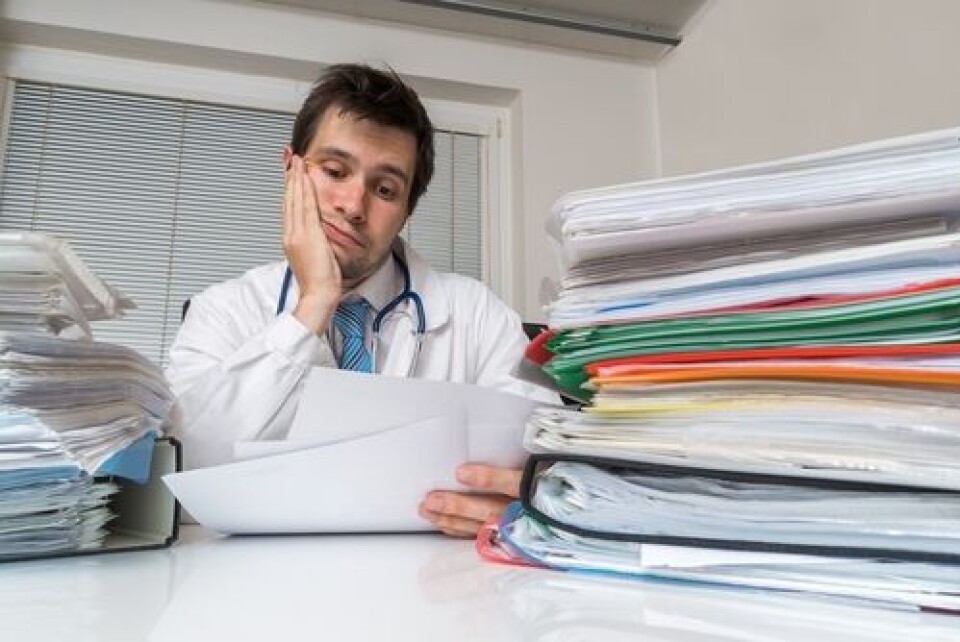-
La Voie Bleue: European Cycle Route of the Year is in France
700km bike path linking Luxembourg and Lyon has been crowned winner of the 2026 title
-
MAP: See how your location in France affects online food shop prices
New analysis shows how your shop compares on average
-
Further sightings of processionary caterpillars in France prompt action from local authorities
Caterpillars have arrived early after mild winter
Minister calls for end to ‘useless medical certificates’ in France
He plans to introduce 15 measures to free up GPs’ time in the context of a lack of healthcare appointments

France’s health minister has joined calls for an end to ‘useless medical certificates’ as a way to simplify and lessen GPs’ workloads amid growing anger over ‘medical deserts’, a lack of staff and GP stress.
François Braun this week announced plans for 15 measures saying we need to ‘give back medical time’ to overstretched doctors. With fewer certificates to complete, he said, they would have more time to see patients in consultation hours.
During a visit to Valenciennes, Mr Braun told the press: “A certificate of good health [asked for by a crèche after a baby has been ill] is absurd, it doesn’t help at all. And there are sports activities that absolutely do not need a medical certificate.”
The report included comments from two doctors, Dr Jacques Franzoni and Dr Pierre Albertini, who both said that filling in needless medical certificates takes up to 90 minutes to two hours per week. These hours would be much better used seeing patients, they said.
The minister said that he would look to “clarify” rules on the subject before the end of March.
He said that the government website service-public.fr would also add a specialist section to bring together all the required medical certificates currently requested by crèches, schools, sporting federations and employers. The aim is to make it easier to see what is needed.
A ‘zero paper’ approach
The minister also said that health authority l’Assurance Maladie would move towards a ‘zero paper’ system before the end of 2023. He said that he aimed to “put in place a reliable solution for the digital sending of proof documents” by doctors.
This would mean that doctors no longer have to deal with the logistics of delivering paper certificates.
The carte Vitale smartphone app would also be rolled out gradually from this year, he confirmed, partly to limit problems with people forgetting their cards.
Read more: Phone app version of France’s carte Vitale to launch in 2023
The Caisse Nationale d’Assurance Maladie also said that it would aim to make administration procedures easier for patients who have long-term health conditions (known as ‘patients en affection de longue durée (ALD)’ in France).
Mr Braun has said that he wants the ALD status to be applied for life to patients who have lifelong, irreversible conditions, so they no longer need to apply for this to be renewed.
He said that he would call on the health authority la Haute Autorité de Santé to review this in the next few weeks.
‘Useless or insulting tasks’
The announcement of the 15 measures comes just a month after 200 GPs signed an open letter that listed seven ‘useless or insulting tasks’ that they have to do, which eat into the time they have to actually see patients and practise medicine.
Read more: French GPs list seven ‘useless or insulting’ tasks they have to do
These included child illness notes so that a parent is ‘allowed’ to stay home from work to care for them, short-term work sickness notes, and at-home care or nurse prescriptions that need renewing every 12 months, even if they have been in place for years.
They also said that sports certificates were ‘unnecessary’ and often stated the obvious, such as that a child in good health can run.
The doctors concluded: “In a context of declining medical access, it is time to rethink the role of GPs. We are not here to be ‘checkers’ or ‘proof’ for Assurance Maladie for private insurance companies or for public or private employers.
“If these various bodies wish to carry out checks, they can hire staff for this purpose and do so. They should stop considering GPs as the guarantor of their distrust of their fellow citizens.”
The GPs added that simplifying the system would save millions in public money and would free up hundreds of thousands of GP consultation slots per day in France.
It comes after GPs and laboratory analysts held a strike from the end of 2022 to the beginning of January this year, and as the problem of ‘medical deserts’ worsens. A ‘medical desert’ is defined by the government as an area in which patients have access to fewer than 2.5 consultations with a local GP per year on average.
Covid has also caused further problems in the shortage of GPs and medical professionals.
Previous articles
Patients fight to reinstate unvaccinated GP in southwest France
French ‘medical deserts’: Mayor’s plea over lack of rural GPs
Digital carte Vitale: Where, how and when is this used in France?
























